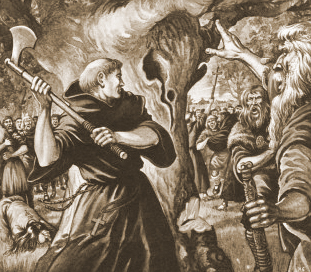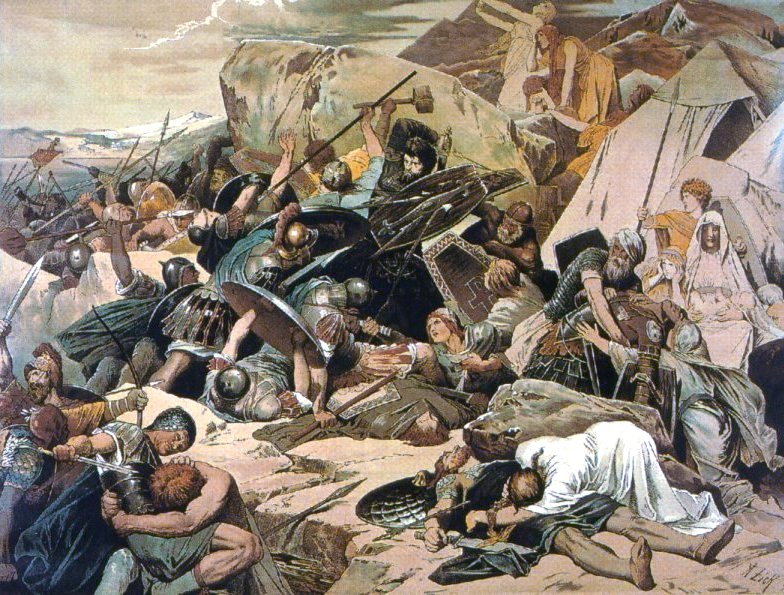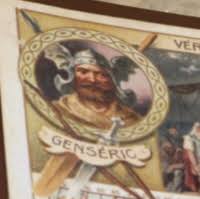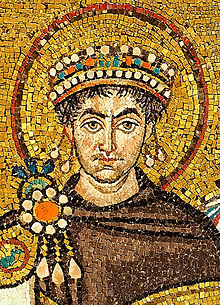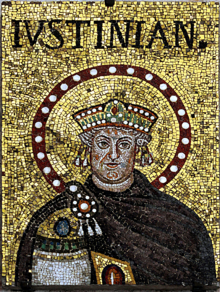For the context of this translation see
the previous instalment of this series.
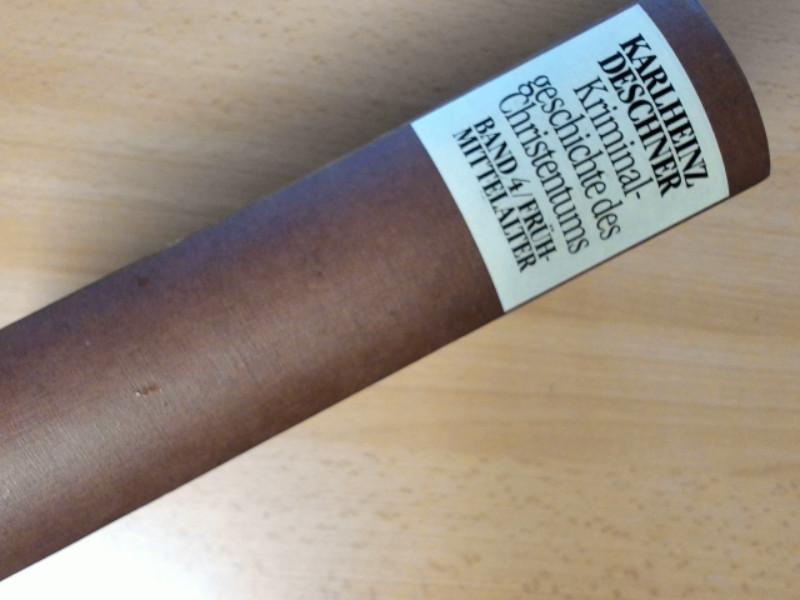
Volume 4. Early Middle Ages
From King Clovis (ca. 500) to the
death of Charles ‘the Great’ (814)
‘For a long time Christ had already taken a look at the Germanic peoples… A new spring dawned on the sky of the Church’. —Leo Rüger, Catholic theologian
‘The life of medieval Christianity is impregnated, and even completely saturated, in its relations by religious conceptions. There is no thing or action that is not constantly related to Christ and the faith. Everything is built on a religious conception of reality, and we find ourselves before an incredible development of inner faith’. —Johan Huizinga
PANORAMIC VIEW
The divisions in historical times are not fixed in advance. They were not decreed in a ‘higher’ place, to be carried out later by humanity. Rather, the history of man is an unheard-of chaos of stories, and later he tries to put a certain order in the zigzagging course of events and the bewildering diversity of tendencies, reducing everything to perfectly clear schemes. It introduces structures and caesuras, and thus the whole appears as an expression of forces that act coherently, and in this way everything is presented as if it had to be that way and could not have been otherwise; as if, for example, the Roman Empire would only have occurred so that Europe could inherit it. That is a vision that favours our taste for periodisation, and that can undoubtedly also encourage it. In reality, all this delimitation and temporal ordering, all these supposed fixed points, indicative data and evolution lines are nothing more than the result of certain—or, better to say, very uncertain—points of view, of precarious attempts at orientation: pure constructions to which people have accommodated, either by giving them meaning or not.
The ‘High Middle Ages’, a period that runs from approximately the 6th to the 10th centuries, is a period of violent change and transformation. But it is also a time of compromises or, to put it more elegantly, of assimilation, of continuity, a period of decadence and transition, of old heritage and a new beginning: in it the constitution of the West, of Europe, takes place, and of Germany, the intertwining of ancient Christian and Germanic traditions, the separation of Byzantium, the Eastern Church, and the arrival of Islam. And it is an age in which politics and religion are inseparable.
The alliances of the popes with the states also change. But, as always when they turn and change direction with time, Rome continually seeks to cling to the strongest power: Byzantium, the Ostrogoths, the Lombards, the Franks, and it takes advantage of them…
From convinced subjects to convinced lords
In Rome the temples collapsed, the imperial palace collapsed, in the theatres and the gigantic baths the ruins piled up and the weeds and ivy grew. And the priests took advantage. The old bath chairs became Episcopal chairs, the sumptuous alabaster and porphyry bathtubs became baptismal fonts and dubious urns of martyrs. Marble wall coverings, precious mosaic floors, beautiful columns, and stones were removed from ancient villas to enrich Christian temples. The pagan temples became Christian churches and the Rome of the Caesars became a clerical city, in which the religious (or what was considered as such) prevailed; and in which all civil festivals disappeared in favour of ecclesiastical festivities. The belief in the imminent end of the world was generalised to such an extent, and such proportions acquired the privileges of the priests, that Emperor Maurice forbade in 592 the entry of soldiers into monasteries and civil servants into the clerical state.
The civil power of the popes—which was the basis of the future pontifical state or the Church—sprouted from ruins: from the rubble of the Western Roman Empire, thanks to the impotence of Byzantium and an ever-growing curial ambition for dominance. Already in the 5th century the bishops of Rome, supposed successors of Jesus who did not want any kingdom of this world or that his disciples carry money in the bag, were the largest landowners of the Roman Empire. And the collapse of that empire only accelerated the rise of the bishops of Rome inheriting entirely the decadent imperial structure.
Under the Merovingians, in the early days of the Byzantine Empire, bishops gained power and influence also in ‘worldly’ or civil affairs, throughout the communal sphere. They control state jobs and trades, urban fortifications, the supply of troops; moreover, they intervene in the appointment of provincial governors.
All disgrace and decay are transformed by the Roman bishops into their prosperity, each failure is turned into a personal advantage, whether it is a disaster in the kingdom of Caesar or the kingdom of God. And even from the misery of the Longobard invasion they know how to make a fortune. First they distance themselves from Byzantium with the help of the Longobard swords—and Byzantium was weakened by the multiple pressure of the ‘barbarians’—; later they will destroy the Lombards thanks to the Franks… always on the side of the robbers, with a parasitic strategy, such as the world had never known.
It is true that even up to 787 the popes date their letters by the years of the reign of the Byzantine emperors, but already under Gregory II (715-731) the Byzantine governor was expelled from Rome on the occasion of the ‘Roman revolution’, just as the Byzantine army of Benevento and Spoleto was expelled with the help of course of the Lombard troops. After the Lombards had contributed to the excessive power of the popes, they used the Franks to annihilate them. From then on they collaborated and prospered with the Frankish emperors. And when they felt strong enough, they wanted to be the lords of the empire too.
Until 753 the Roman pope was a devoted subject (to a greater or lesser degree) of Constantinople. But soon in Rome time is no longer counted for the emperor’s years, imperial coins are no longer minted, imperial images are removed from churches, and the emperor’s name is no longer mentioned in liturgical service. The pope, on the contrary, allies himself with the Germanic king against those who had hitherto been his sovereigns. And to the Germanic king the pope confers imperial privileges, among which there are some completely new ones, and even offers him the imperial crown. It is a policy that benefits the pope above all, since it almost makes him the ‘father of the ruling family’.
The imperial coronation of Charles in 800 in Rome by Pope Leo III was an unlawful act, a provocation to the Byzantine emperor, until then the only legal supreme head of the Christian world, and in Constantinople it could only be interpreted as a rebellion. In fact, the turn of the popes towards the Franks caused the definitive break with Byzantium.
And although in 812 Emperor Michael I Rhangabe recognised Charles ‘the Great’ as imperator of the West and as a peer sovereign, deep down Byzantium always considered the Western empire as a usurpation. At Lothair’s coronation in 823, the pope gave him the sword for the defence and protection of the Church: and gradually Rome brought the Roman-Germanic kings under his influence. Indeed, after the fall of the western Roman monarchs, new symbioses were introduced with the new rulers, with Theodoric, Clovis, Pepin, and Charles. But also the future great Germanic empires of Alfred (871-899), Otto I (936- 973) and Olaf the Saint (1015-1028), who promoted the spread of Christianity with barbaric methods, could only be established on a Christian basis, not to mention the medieval Germanic empire.
That Holy Roman Empire certainly had hardly anything Roman and absolutely nothing sacred and holy, unless (with good reason) like Helvétius, Nietzsche and others the compendium of the criminal is seen in the sacred. Be that as it may, by liquidating the relative achievements of Arians and pagans and by obtaining a state of its own, the papacy achieved the constant enlargement of both its power and its possessions.
Especially at the beginning of the Middle Ages the chaining of State and Church was very close. Not only did civil and canon law have the same basis, but clerical wishes and demands also found expression in civil law. The decrees of the ‘mixed council’ were valid for the State and the Church alike.
The bishops also came from the aristocracy and were related to it as brothers, nephews and children of the civic nobility. And with it they shared the same political and economic interests. Consequently, throughout the Middle Ages they were also drawn into the struggle of the lords, they fought with the kings against the emperor and with the emperor against the pope, and with one pope against the other for 171 years. They fought with the diocesan clergy against the monks and also against their colleagues, giving them battle in the field, in the streets and the churches with the dagger and with the poison and in every imaginable way. High treason and rebellion were for the clergy, according to the Catholic theologian Kober, ‘a completely common phenomenon’.
Faced with the States and the so-called authorities, the great Christian Church had in practice no other principle than this: it always pacts with the most profitable power. In all its state contacts the Church was only guided by taking advantage of the situation (in her language, guided by ‘God’). Opportunism was always the supreme principle. Only when that Church achieved what it wanted was it also willing to give something and naturally as little as possible, even if it promised a lot. ‘You annihilate the heretics with me, and I will annihilate the Persians with you’, the patriarch Nestorius invited the emperor in his inauguration speech in 428 without imagining that he himself would soon be condemned as a ‘heretic’…
And with their sights set on their own power, the fought Catholic emperors and princes also kept Church and State closely united, despite tensions, conflicts and confrontations of all kinds, from the end of the Old Age to the time of the Protestant Reformation. Throughout more than a millennium the history of the two institutions could not be separated. Furthermore, ‘At the epicentre of all interests, whether they were spiritual or political, was the Church; to her belonged the action and omission, politics and legislative power, all the driving forces of the world were at her service and from her they derived their prerogatives. The culture and history of the Middle Ages are confused with the Church’.
With its powerful material protection, its organisational strength and participation in the legal and political-state life, its influence grew continuously. The pre-Constantinian Catholic Church strictly forbade clergymen to accept public office; but already in late antiquity a bishop of Gaul was entrusted with certain military options, such as building a fortress. And what was lost in the south to the Arabs, the ‘infidels’, was offset by the spread of Christianity northward.
Under the Merovingians, Christianity became the ideological deciding power. There were almost formal dynasties of bishops, to the point that Chilperic I famously uttered the phrase: ‘No one governs more than the bishops; that is our glory’.
Also among the Arian Ostrogoths the episcopate assumed state functions. In early Middle Ages England, ecclesiastical prelates are members of the diets, statesmen, and field marshals. Together with the regent they define the law, they are his first advisers; they elect the kings, overthrow them and raise them. Also in Italy bishops and abbots acted, along with the counts, as administration officials and, together with the lords of the civil aristocracy, acted as legislators. It is evident that from the middle of the 6th century to the end of the 7th century, public life there was totally marked and dominated by the Church.
Also later, if we look beyond the period to which we are referring, the Church survived its allies and overcame all the collapses. One power was sinking, and she was already rising with the next; or at least she was prepared for it. It was indeed only a state together with other states, but her ‘metaphysics’ was ahead of all of them. And while she always pretended the religious, the spiritual visions while proclaiming to the whole world, she aspired to the political dominion of the world.
Relatively early, popes and bishops had already tried to make the state their bailiff, submitting it to themselves. Some Church Fathers, such as Ambrose or John Chrysostom make it clear that way. But it is Pope Gelasius I (492-496) who only a few generations later proclaims with the greatest arrogance his ‘doctrine of the two powers’, which was to have such relevance in world history. Shortly after, the royal power will have to ‘piously submit the neck’ to the sacred authority of the bishops.
Augustine, however, does not yet know the doctrine of subordination of the State. At a time when the Church lived in harmony with it, the saint was able to assure—heaven knows how many times—that the Christian faith reinforced the loyalty of citizens to the state and that it created obedient and willing subjects. It was totally indifferent about who the ruler was. ‘What does it matter which government man lives under, who must die anyway? The only thing that matters is that the rulers do not induce him to impiety and injustice!’ It is true that if ‘justice’ was lacking, and that means here the Church, the bishop, for Augustine governments were hardly anything other than ‘great gangs of robbers’.
But in the Middle Ages the ambition of the clergy to dominate grew along with their power… If at the beginning the papacy defended the doctrine of the two powers or authorities, the auctoritas sacra pontificum and the regalis potestas which complemented each other, then the doctrine of the ‘two swords’ was later introduced (duo gladii). According to the Roman affirmation, Christ would have granted to the papacy the two swords, the spiritual and civil power; in a word, it would have given her hegemony. For when the Roman pontiffs seized power and became sovereigns of a State, they no longer needed a strong hereditary Germanic monarchy, nor did they need the monarchical unity of Italy, which for the same reason they fought with all means to its scope, even by force of arms.
The objective of the papacy was then the political domination of the world under spiritual slogans. While it exercised a spiritual guardianship over the masses and while it referred the whole of life to a future kingdom of God and the obtaining of eternal happiness, it did not stop pursuing more and more material interests. The papacy emancipated itself from the western empire and in a secular struggle it made the Hohenstaufen bite the dust to become sovereign of everyone and everything. A true parasite, who after having drunk the blood of others, after having perched on high with lies and falsehoods and after having been eliciting more and more rights and powers, stripped them and even took up arms, and with celestial speeches continued to worry about its earthly power in an extremely brutal way.
In theory, the Pauline doctrine of the divine institution of authority and the duty of general submission became fundamental for relations with the State. The obedience that is preached there, the absolute docility of the subjects, contrasts openly with the hatred against the State so widespread among the first Christians, but it has continued to be decisive to this day. In this way the Church wins over the respective rulers, with whom it has to collaborate to keep itself in power.
With Gregory VII (author of the Dictatus papae), who in 1076 began the fight against the emperor, who claimed rights over Corsica and Sardinia, over the Norman kingdom of southern Italy, over France, Hungary, Dalmatia, Denmark and Russia, there are already perceived certain resonances of a theory, according to which the pope has all power, including the right to dispose of the States. Gregory and his successors claim at least one indirect potestas indirecta in temporalice that the bull Unam sanctam (1302) of Boniface VIII raises to a potestas directa in temporalia on which the Lateran Council of 1517 still insists, and from which only in 1885 will Leo XIII officially distance himself.
According to Gregory VII and his successors in the late Middle Ages, and always in connection with Augustine’s thought, imperial power has its origin in the devil. It is a ‘carnal’ power as are generally all worldly principalities. But the diabolical power can be turned into blessing through the forgiving, healing and saving power of the papacy, through subordination to the Priest-King. Furthermore, the founding of every new state in this world tyrannised by the devil is only legitimised by papal recognition. The pope appears there as the sole supporter of truth and justice, as the sovereign lord and judge of the world. Everything must render obedience to the successor of Peter. This is how the pope wrote:
Whoever is separated from Peter cannot obtain any victory in the struggle or any happiness in the world, for with rigour as hard as the steel he destroys and smashes everything that comes his way. Nobody and nothing escapes its power.
